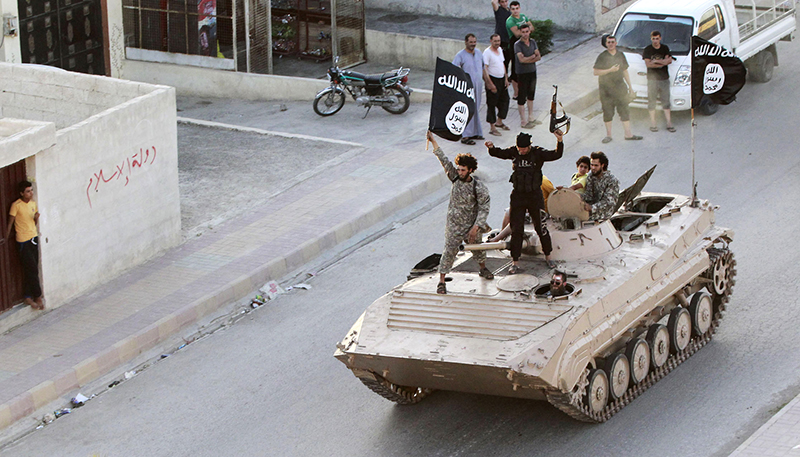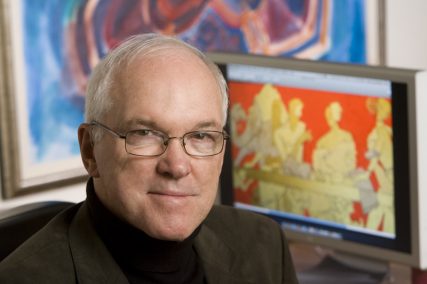
Islamist fighters take part in a military parade in Syria’s northern Raqqa province June 30, 2014, to celebrate their declaration of an Islamic “caliphate” after the group captured territory in neighboring Iraq, a monitoring service said. Photo courtesy of REUTERS/Stringer
*Editors: This photo may only be republished with RNS-LAWRENCE-COLUMN, transmitted on Feb. 25, 2015.
(RNS) Less than six months ago, few outside the Middle East knew much about a group called ISIS or ISIL or the Islamic State. It was not till mid-June that its leader, Abu Bakr al-Baghdadi, proclaimed himself the caliph, and ISIS the territory he ruled.
As a movement, however, ISIS has been around for over a decade. It pledged allegiance to al-Qaida back in 2004, opposed the U.S. presence in Iraq and opened a new front in war-torn Syria. When the two wings, from Iraq and Syria, merged in April 2013, al-Baghdadi also cut off ties with al-Qaida.
ISIS may seem like al-Qaida. Both claim the mantle of Islam in opposing the West in general, but especially the U.S.-allied military presence in the Middle East and North Africa.
Yet ISIS is unlike al-Qaida in leadership and structure, ethos and intent. Al-Baghdadi is an Iraqi warrior imprisoned during the U.S. occupation, during which time he forged a network with like-minded Sunni fighters. ISIS is also more numerous, with an army of 30,000, while al-Qaida never numbered more than 3,000 at its height in the late 1990s. And ISIS wants to be a “state.”
In a form of diplomatic jiujitsu, ISIS has now compelled the Obama administration to make the group Public Enemy No. 1.
In September, the Department of Homeland Security announced a high-level summit to counter the threats of religious extremism abroad and at home. The summit did not take place until last week. In the meantime, there were the Charlie Hebdo attacks, along with a Paris supermarket attack, the Copenhagen outburst, the ongoing beheadings. Suddenly ISIS had become the foreign and domestic policy issue for an American administration in the homestretch.
The three-day symposium on religious terrorism became best known for what it did not mention: Islamic terrorism. Many circumlocutions were woven into President Obama’s address without ever mentioning Islamic terrorism by name, and it was that subterfuge that made it possible for journalists to pounce.
Less than a week ago, The Atlantic published a feature essay by Graeme Wood. “What ISIS Really Wants” was the provocative title, and the subtitle gave the thesis:
“The Islamic State is no mere collection of psychopaths. It is a religious group with carefully considered beliefs, among them that it is a key agent of the coming apocalypse.”
Wood argues:
“The reality is that the Islamic State is Islamic. Very Islamic. Yes, it has attracted psychopaths and adventure seekers, drawn largely from the disaffected populations of the Middle East and Europe. But the religion preached by its most ardent followers derives from coherent and even learned interpretations of Islam.”
The 10,000-word article featured citations from notable scholars such as Bernard Haykel, an expert on early modern Yemen from Princeton. Yet, just because some scholars have said things that echo ISIS propaganda does not make the movement itself Islamic, much less very Islamic, as Wood asserts with Haykel as his authority. Of course, there are some Islamic antecedents, but to say that ISIS is very Islamic exaggerates its credentials.
Sparring with Haykel about the theological legitimacy or falsity of ISIS, moreover, misses the larger point that Wood wants to downplay: The appeal of ISIS is precisely to “psychopaths and adventure seekers, drawn largely from the disaffected populations of the Middle East and Europe.”
As another Yemeni expert, Dan Varisco, wrote: “To the extent that what ISIS leaders are doing is repudiated by just about every reputable Islamic organization and scholar and the vast majority of Muslims everywhere, it is irresponsible to say what they are doing is very Islamic. All religions have individuals who do things that others in the same religion find morally wrong or reprehensible or even heretical. ISIS is no exception.”
Wood is fond of citing ISIS proclivity to apocalyptic imagery. He ventures into pop psychology when he speculates that “for certain true believers — the kind who long for epic good-versus-evil battles — visions of apocalyptic bloodbaths fulfill a deep psychological need.” Or is this merely millennial bluff in Islamic rather than the familiar Christian guise?
Hal Lindsey, author of “The Late Great Planet Earth,” must be chuckling somewhere deep in Texas. It is the same grasping for scriptural, historical convergence on an end time that motivates millennialists whether in Mosul or Houston. Yes, it does make lively narrative, but it is slipshod history as also slippery theology.

Bruce B. Lawrence is emeritus professor of Islamic studies at Duke University and author of the forthcoming book “Who is Allah?” Photo courtesy of Bruce B. Lawrence
No less slippery is the major issue that Wood never confronts: orthodoxy. Who is a “real” Muslim? And who judges who is a “real” Muslim? ISIS offers a version of Islam and the Prophet Muhammad that few Muslims would recognize or honor. Like many Christian charlatans, ISIS dresses itself up in all the panoply of true religion. As Juan Cole, a sage blogger, put it, “very large numbers of ISIS are just criminals who mouth pious slogans. The volunteers from other countries often have a gang past. They engage in drug and other smuggling and in human trafficking and delight in mass murder. They are criminals and sociopaths.”
ISIS is as much an idea as a movement. It functions now over a broad swath of territory in Syria and Iraq. Even if it is militarily defeated, it has spawned the desire for a “true” Islamic state. The most effective means to degrade ISIS is to disengage it from its lower-class Sunni social base. That would require giving some hope to Iraqi Sunnis through the government in Baghdad, but also resolving the Syria conflict in a manner that does not further alienate Sunnis there. It is a daunting task, as much socio-economic as military, political or religious in its complexity. As long as there are broken states, dispirited youth and rampant sectarianism, ISIS, or its successor, will generate appeal, find recruits and stage war, however defective its theology, however degenerate its protagonists.
(Bruce B. Lawrence is emeritus professor of Islamic studies at Duke University and author of the forthcoming book “Who is Allah?”)
YS/MG END LAWRENCE




